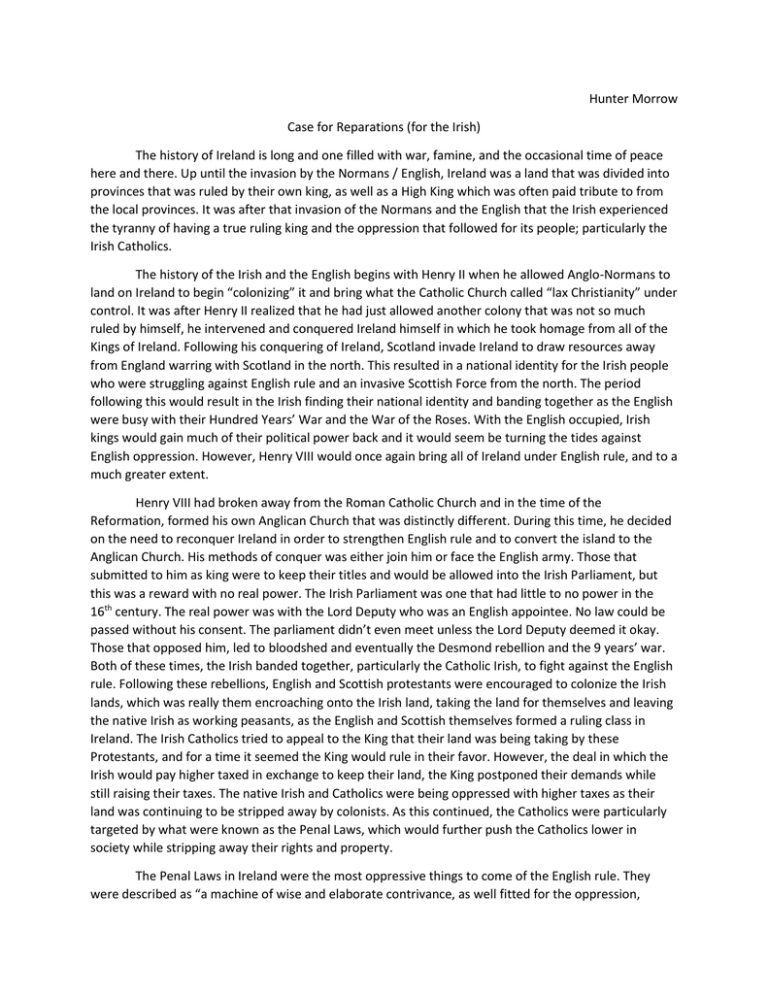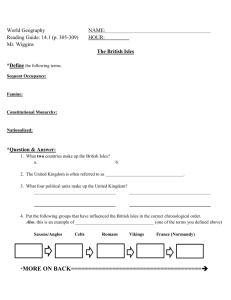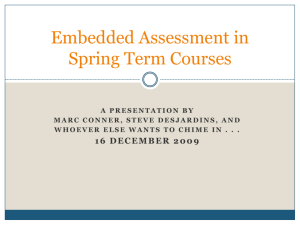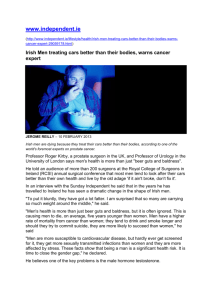Ireland Draft
advertisement

Hunter Morrow Case for Reparations (for the Irish) The history of Ireland is long and one filled with war, famine, and the occasional time of peace here and there. Up until the invasion by the Normans / English, Ireland was a land that was divided into provinces that was ruled by their own king, as well as a High King which was often paid tribute to from the local provinces. It was after that invasion of the Normans and the English that the Irish experienced the tyranny of having a true ruling king and the oppression that followed for its people; particularly the Irish Catholics. The history of the Irish and the English begins with Henry II when he allowed Anglo-Normans to land on Ireland to begin “colonizing” it and bring what the Catholic Church called “lax Christianity” under control. It was after Henry II realized that he had just allowed another colony that was not so much ruled by himself, he intervened and conquered Ireland himself in which he took homage from all of the Kings of Ireland. Following his conquering of Ireland, Scotland invade Ireland to draw resources away from England warring with Scotland in the north. This resulted in a national identity for the Irish people who were struggling against English rule and an invasive Scottish Force from the north. The period following this would result in the Irish finding their national identity and banding together as the English were busy with their Hundred Years’ War and the War of the Roses. With the English occupied, Irish kings would gain much of their political power back and it would seem be turning the tides against English oppression. However, Henry VIII would once again bring all of Ireland under English rule, and to a much greater extent. Henry VIII had broken away from the Roman Catholic Church and in the time of the Reformation, formed his own Anglican Church that was distinctly different. During this time, he decided on the need to reconquer Ireland in order to strengthen English rule and to convert the island to the Anglican Church. His methods of conquer was either join him or face the English army. Those that submitted to him as king were to keep their titles and would be allowed into the Irish Parliament, but this was a reward with no real power. The Irish Parliament was one that had little to no power in the 16th century. The real power was with the Lord Deputy who was an English appointee. No law could be passed without his consent. The parliament didn’t even meet unless the Lord Deputy deemed it okay. Those that opposed him, led to bloodshed and eventually the Desmond rebellion and the 9 years’ war. Both of these times, the Irish banded together, particularly the Catholic Irish, to fight against the English rule. Following these rebellions, English and Scottish protestants were encouraged to colonize the Irish lands, which was really them encroaching onto the Irish land, taking the land for themselves and leaving the native Irish as working peasants, as the English and Scottish themselves formed a ruling class in Ireland. The Irish Catholics tried to appeal to the King that their land was being taking by these Protestants, and for a time it seemed the King would rule in their favor. However, the deal in which the Irish would pay higher taxed in exchange to keep their land, the King postponed their demands while still raising their taxes. The native Irish and Catholics were being oppressed with higher taxes as their land was continuing to be stripped away by colonists. As this continued, the Catholics were particularly targeted by what were known as the Penal Laws, which would further push the Catholics lower in society while stripping away their rights and property. The Penal Laws in Ireland were the most oppressive things to come of the English rule. They were described as “a machine of wise and elaborate contrivance, as well fitted for the oppression, impoverishment and degradation of a people, and the debasement in them of human nature itself, as ever proceeded from the perverted ingenuity of man.” – Edmund Burke (Britanica). Catholics were banned from holding public office or joining the army, meaning the entirety of Ireland would be ruled by an English Government. There was also an additional tax that was levied on the Catholics for not practicing the Anglican religion. After the Irish Rebellion of 1641, and the re-conquest by Cromwell, harsher laws were enacted which stripped land from major landowners who were Catholic, they were banned from the Irish Parliament entirely, for a short time they were even banned from living in towns. Catholic clergy were executed if found and were forced to leave Ireland. Yet another attempt was made at freedom with the Jacobites in the Williamite war, but again the Catholics were defeated and harsher laws were enacted. Catholics were excluded from legal professions, excluded from voting, banned from buying land, prohibited from owning a horse over the value of 5 pounds, and Catholics were banned from being educators as well. The Irish Catholics and many of the native Irish were completely oppressed from these laws, preventing them from moving up in society and owning land. Economically the Irish were one of the most important overseas trade for the English. Timbering cut down much of the forestry in Ireland. Ireland also was one of the biggest exports of salt beef, pork, butter and hard cheese. But despite this, were the native Irish and Catholics thriving? No. Much of these exports went to supporting the British army and England itself. Instead, the Irish were left to starve which led to the famine of 1740-1741 in which 400,000 people died of starvation. The bishop of Cloyne had stated “how a foreigner could possibly conceive that half the inhabitants are dying of hunger in a country so abundant in foodstuffs?” (Britanica). The disparity of economic conditions led to another rebellion towards the end of the 1700s which had support from the French. However the rebellion was put down again, and Ireland was annexed into England which led to a dissolved Irish Parliament. Following the union which created the United Kingdom from Ireland and England, Ireland was ruled entirely from the British Parliament. The Irish were initially barred from membership in the British parliament but this later changed with the appointment of Daniel O’Connell. Despite the union with England, the Irish economy was still in shambles for most of the 19th and early 20th century. The Great Irish Famine which occurred in 1845-1849 happened due to massive exports of food FROM Ireland with little of the food remaining to help feed the growing population. The English at any point could have helped the starving Irish by lowering the exports of the food and providing handouts to help them through the lessened harvest, but the English government ignored the Kingdom which they forced into a union, and left over 1 million Irish to die in these 4 years of famine. Many tried to escape to the United States, where the Irish were met with more discrimination from a different government. The English attempted to appease the Irish to prevent another United States equivalent rebellion with several home rule acts that would create an Irish government. These were postponed however due to WWI and would lead to the creation of the IRA. The IRA would be the driving force in the fight for Irish independence. With guerilla war tactics, the IRA would fight English paramilitaries from the end of the First World War till 1921 in which a treaty would be signed and the Irish Free State created. Northern Ireland, which was mostly protestant would remain in the United Kingdom. Southern Ireland however would not fully evict English involvement until 1949 with the Republic of Ireland act. This would finally bring full Irish independence for southern Ireland. But at what cost? Since the English landing in 1155 till the treaty in 1921 millions of Irish natives would die either to famine, lost rebellions and massacres by the English and English loyalists. Irish land would be taken for English supporters, Catholics would be prosecuted, executed and oppressed by the Penal laws. A group of people that were united in a single cause to fight English oppression would be prevented from having independence for nearly 900 years. Even when the Irish became part of the English kingdom, they would still be ignored and left to die in the millions with famines that easily could have been remedied or at least have the cost reduced with English aid and involvement but there was none. These atrocities from the English could easily warrant the need for reparations that would help build the Irish economy that was for so long restricted and pay back for the stolen land, the millions of lives lost and nearly 900 years of oppression. Sure the Irish eventually got their independence and the Republic of Ireland is one that is thriving today and no longer has a hindered economy, but their independence was stalled for so long at the hands of the English. However, this example of the Irish leads me to a different stance on reparations in general for any group of people that have been oppressed in history. So many races and ethnicities have been oppressed by another group of people that have prevented them from becoming free or thriving as a country. The Armenian genocide, the imperial atrocities in the African nations from European countries, the Romans conquering several groups of people, the Mongolian conquests, the Japanese in China, British rule in India, slavery in the United States, the Albanians. The list goes on and on of people that have been oppressed at one time or another in history or continue to be oppressed. Reparation arguments could be made by so many groups against many different countries but how would these arguments even be valid? My family came from Ireland, would they deserve reparations now that will live in America? My roommate is a first generation American, should they have to pay reparations for the history of slavery that occurred in the United States? What of the people that have recently moved to England that know nothing of what happened to the Irish people? Would they owe something to the Irish? The argument for reparations is a ludicrous argument to be made by anyone. While the oppression of any group of people is an ugly fact of history, it cannot be resolved by reparations in such a diverse would in which people have become emigrants by their own right into other countries in which they were not involved in the atrocities. History is history and it should be left there. It is meant for us to learn from so that we do not commit the same mistakes, we can only move forward and build a better tomorrow without having to create a further cycle oppression by trying to pry reparations from another group of people for which they may have had no involvement in the previously occurred grievances.








